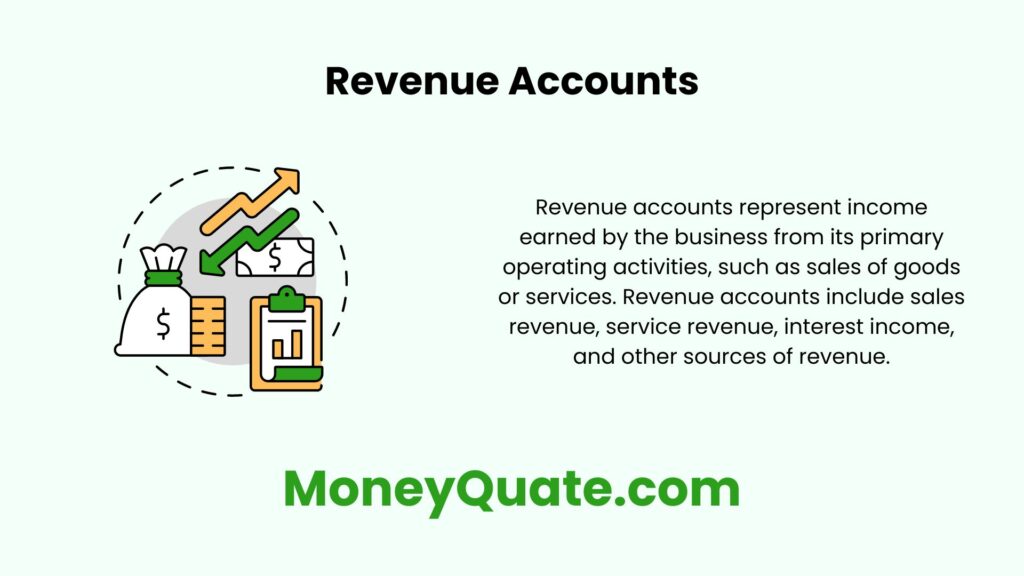Every business thrives on income, and keeping track of that income is crucial! Revenue accounts act like a financial victory lap, recording all the money your business earns from its activities.
As accountants, we use revenue accounts to identify and organize the income generated by your business.
Think of them as special jars in your financial trophy cabinet, collecting the fruits of your hard work!

Contents
What Goes into Revenue Accounts?
Not all income belongs in a revenue account.
Here are some common types of revenue that have their own dedicated jars (accounts) in the ledger:
- Service Revenue: This is income earned by providing services to customers. Imagine it as the money you get for doing what your business does best!
- Examples: Consulting Fees, Hairdressing Services, Repair Service Charges.
- Sales Revenue: This is income earned by selling products to customers. Think of it as the money you collect from selling your amazing products!
- Examples: Product Sales Revenue, Bookstore Sales, Clothing Store Sales.
- Other Income: This category captures any other income your business earns outside of core services or products. Imagine it as finding a bonus coin in your trophy cabinet!
- Examples: Interest Earned on Investments, Rental Income from Property.
Keeping Track in the Ledger
Each revenue account has its own designated spot in the ledger. Here’s a simplified view of what you’ll find inside:
- Account Name: Clearly states the type of revenue, like “Sales Revenue” or “Consulting Fees.”
- Date: Records the date of any transaction that generates income (a sale, providing a service, etc.).
- Credit: This side shows all the income your business earns. Think of it as adding coins to your trophy jars!
- Debit: This side (typically unused) would show any decreases in revenue (rare situations like refunds).
- Balance: This reflects the total income earned for that specific revenue account.
Why Revenue Accounts Matter?
Revenue accounts are like financial cheerleaders for your business, providing valuable insights in several ways:
- Performance Tracking: By tracking revenue, you can see how well your business is performing and identify areas for growth.
- Profitability Analysis: Revenue accounts are key to calculating your business’s overall profit, which shows your financial success.
- Financial Planning: Understanding your revenue helps you plan for the future and make informed financial decisions.
Real-Life Example
Let’s see a revenue account in action:
Account Name: Sales Revenue
| Date | Description | Credit | Debit | Balance |
|---|---|---|---|---|
| Oct 1 | Opening Balance (sales from previous period) | $10,000 | – | $10,000 |
| Oct 10 | Sold Furniture | $2,000 | – | $12,000 |
| Oct 15 | Returned Item by Customer | – | $500 | $11,500 |
The Revenue Recognition Reminder
Revenue accounts might seem straightforward, but they involve following specific accounting principles.
These accounts help ensure your business accurately reflects its income and celebrates all the financial victories it deserves!
So next time you hear about revenue accounts, remember – they’re not just about recording money, they’re about acknowledging your business’s hard-earned success!